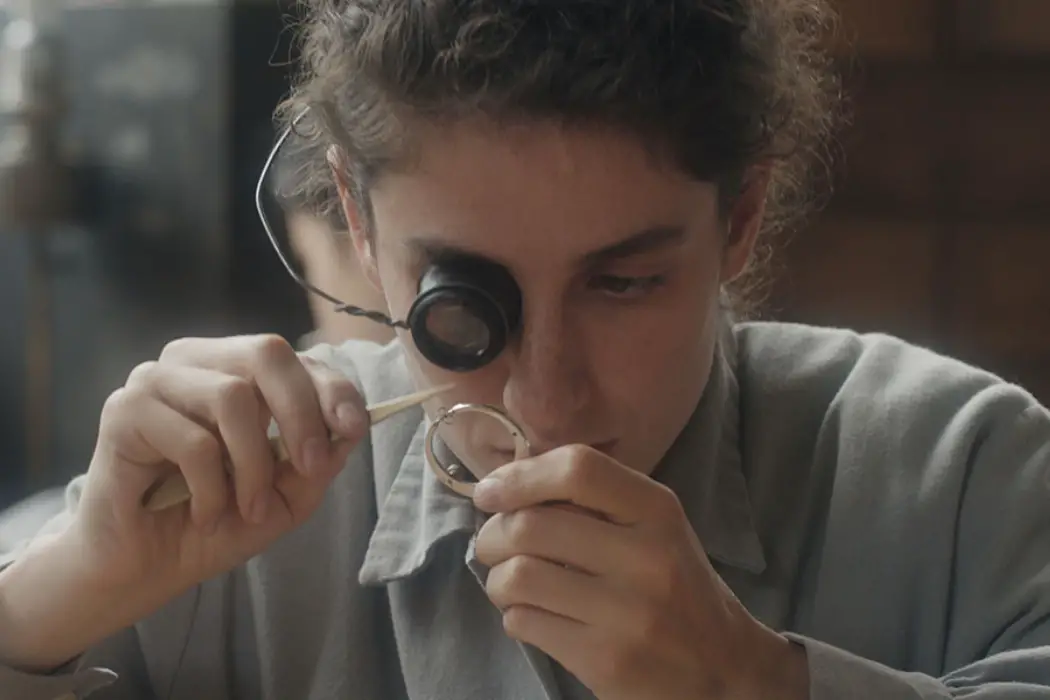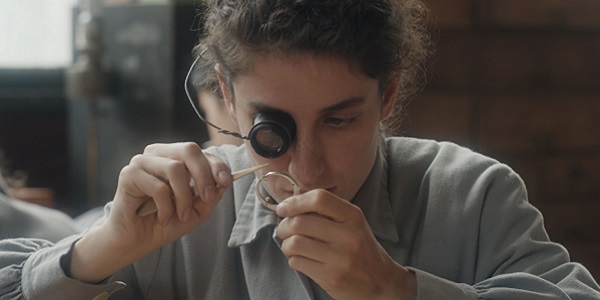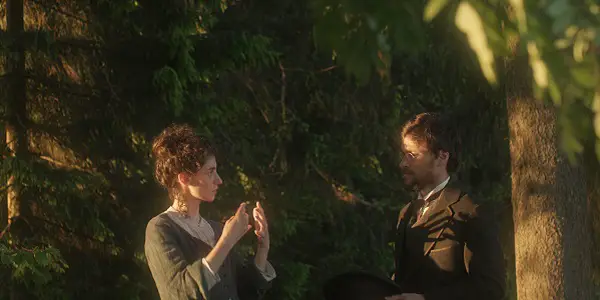UNREST: In Search Of Lost Time

Lee Jutton has directed short films starring a killer toaster,…
In the 1870s, Russian geographer Pyotr Kropotkin came to Switzerland and became acquainted with the Jura Federation, a community of anarchists based in the Swiss watchmaking town of Saint-Imier. This period of time, during which exposure to the Jura Federation’s egalitarian, anti-state views converted Kropotkin to anarchism, is documented in writer-director Cyril Schäublin’s elegant and unusual new drama, Unrest. Taking its name from the crucial piece at the heart of the watches its characters spend their days laboring over, as well as the burgeoning feeling that these workers all deserve better than what they’ve got, Unrest is startlingly quiet and contemplative for a film concerning such revolutionary topics, shot in long, static takes that further emphasize its focus on the passage and usage of one’s time.
Community Over Capitalism
Josephine (Clara Gostynski) and her fellow workers spend long days in the Saint-Imier watch factory hunched over these delicate, intricate devices, peering at them through magnifying goggles that enable them to make the incredibly subtle adjustments needed for each piece to function. Their time is so carefully controlled by the factory bosses that their journeys to the telegram office and elsewhere are closely documented; if the shortest and most efficient route available is not used, time is deemed wasted, and the workers reprimanded. (That the factory, the telegram office, and other locations in town all keep time differently doesn’t help matters.)

As Josephine works, she listens to the anarchists around her — the majority of whom are women — as they discuss alternative methods of obtaining health insurance, report on their correspondence with other workers’ collectives, organize fundraising auctions for striking workers abroad, plan electoral strategy, and engage in other forms of mutual aid. The more Josephine sees and hears, the more intrigued she is by the movement and inspired to join her colleagues. The same goes for Russian traveler and mapmaker Pyotr Kropotkin (Alexei Evstratov), whose path crosses Josephine’s during their introductions to anarchism and sparks the potential of a romance.
Solidarity Forever
It’s impossible to not find inspiration in the movement depicted in Unrest, where individuals are valued as part of a collective and treated with the respect and care that they deserve. The film’s script takes its inspiration both from Kropotkin’s Memoirs of a Revolutionist as well as Schäublin’s own family history; his grandmother worked in a Swiss watch factory assembling the unrest wheel and was the inspiration for the character of Josephine. The dialogue is often dry, especially when articulated by the ensemble cast of non-professional actors, but the hopeful ideology at its heart grabs one’s attention regardless of the sometimes-stilted delivery.

Watching an older woman worker at the watch factory first be docked wages for being slightly late to her shift, then be sentenced to jail time for being unable to pay her taxes, is an uncomfortable reminder that the ruling class doesn’t have our best interests at heart and never have; they only value us for what they can take from us to line their pockets. In addition, the film’s depiction of the ways that newly developed technologies — the telegraph, the watch, and more — are quickly co-opted by capitalists to take further advantage of workers is disturbingly timely; just look at how film and television studios are threatening to replace striking writers with artificial intelligence if they don’t accept their current lot.
Apart from the ideology at its center, the most fascinating thing about Unrest is Silvan Hillmann’s cinematography. The camera is almost entirely static — there is no movement until the final shot of the film — and the characters are almost hidden within many of the shots. Instead of being front and center, they often lurk on the edges of frames or behind walls as they speak, a fitting technique considering how often these discussions concern topics that must remain secret from the powers that be. Shot entirely in natural light and without a score — the only music comes from choirs that sing in a couple of scenes — the overall effect is one of incredible naturalism. Indeed, even though the costumes and sets convey that this is a historical drama, watching Unrest often feels as though you are eavesdropping on something that is happening right here and now.
Conclusion
If you aren’t already disenchanted with capitalism and the way it sucks people dry, working them to exhaustion so that they have no time for what brings them genuine happiness, then Unrest is here to help.
Unrest is currently playing at Film at Lincoln Center in New York and opens at the Laemmle Monica Film Center in Los Angeles on May 19, 2023.
Watch Unrest
Does content like this matter to you?
Become a Member and support film journalism. Unlock access to all of Film Inquiry`s great articles. Join a community of like-minded readers who are passionate about cinema - get access to our private members Network, give back to independent filmmakers, and more.
Lee Jutton has directed short films starring a killer toaster, a killer Christmas tree, and a not-killer leopard. Her writing has appeared in publications such as Film School Rejects, Bitch: A Feminist Response to Pop Culture, Bitch Flicks, TV Fanatic, and Just Press Play. When not watching, making, or writing about films, she can usually be found on Twitter obsessing over soccer, BTS, and her cat.













